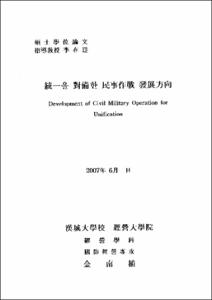統一을 對備한 民事作戰 發展方向
= Development of Civil Military Operation for Unification
- Files in This Item:
-
-
Download
 000000557051.pdf
기타 데이터 / 2.83 MB / Adobe PDF
000000557051.pdf
기타 데이터 / 2.83 MB / Adobe PDF
-
Items in Repository are protected by copyright, with all rights reserved, unless otherwise indicated.